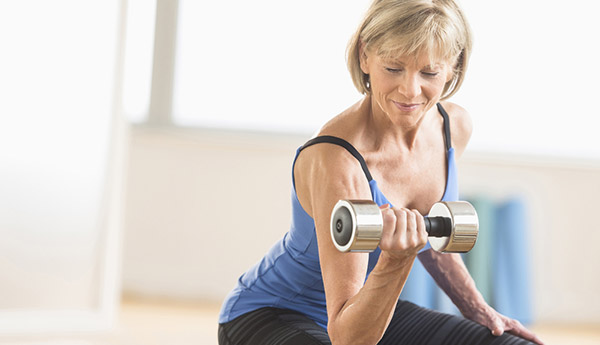The musculoskeletal system allows our bodies to move. It is made up of the muscles (muscular) and bones (skeletal). This vital collection of muscles, cartilage, tendons, bones, ligaments and joints provides support, stability and determines our overall shape.
Sometimes things go wrong with our musculoskeletal system or ‘frame’. While osteoarthritis, osteoporosis and the loss of muscle mass are associated with different parts of your frame, they all affect the strength of your musculoskeletal system.
Muscles
A loss of muscle mass is common after prolonged illness, injury or inactivity. This can have a severe outcome such as physical disability, loss of independence and a poor quality of life. Age-related muscle-mass loss is most commonly associated with a lack of physical activity and poor nutrition.
Joints
Osteoarthritis is a condition that affects the whole joint – including the bones, cartilages, ligaments and muscles – and can include swelling of the tissue around the joint, as well as deterioration of the ligaments in the joint. Research shows that the risk of developing osteoarthritis increases if you have a family history of the condition or if you’re overweight.
Bones
Osteoporosis is a loss of bone strength, making bones more fragile and prone to fracture. There are a range of factors that contribute to the loss of bone strength, including some types of medicines and particular illnesses. However, the hormonal changes that come with menopause can also affect the strength and density of womens’ bones. A family history of osteoporosis can also contribute to your likelihood of weak bones as you age.
Keeping your frame strong
What can you do to help keep your frame healthy and strong? Jean Hailes’ endocrinologist Dr Sonia Davison says, “Things that can contribute to bone density loss may include lack of weight-bearing exercise, low vitamin D, low calcium intake, excessive alcohol consumption, smoking, caffeine excess and being underweight.”
The good thing is that there are a number of things you can do to help keep your frame strong as you age, such as choosing the right foods. The three main nutrients that contribute to strong bones and muscles are calcium, vitamin D and protein. Yoghurt, almonds and tinned sardines are all excellent sources of calcium. Small amounts of vitamin D are found in foods such as some mushrooms, fish and egg yolks. Including sources of protein – such as tuna, chicken or legumes – is essential, as protein is the building block of healthy bones and strong muscles.
Nutrition can also help to alleviate some of the symptoms of arthritis. When it comes to your joints, “A diet rich in fatty fish, dark leafy greens, whole grains and whole soy (such as tofu and tempeh) may help to relieve the inflammation that is associated with arthritis”, says Jean Hailes’ naturopath Jess Gleeson.
Leading an active lifestyle can reduce your likelihood of developing osteoporosis, arthritis or losing muscle mass. Weight-bearing exercise, such as walking, jogging or dancing, is great for strengthening bones and muscles. Just make sure you don’t do anything that might impact any other conditions or injuries. It’s also just as important to do some strength training to build your muscle mass – such as using weights or your own body (e.g. push ups).
Weight-bearing exercises, strength training and stretching, just two to three times a week, can help to keep your frame healthy.
If you are starting a new exercise program, it is a good idea to speak with your doctor before you start. For more information about incorporating strength training into your routine, visit the Living Longer Living Stronger website for exercises specifically for the over 50s.
Published with the permission of Jean Hailes for Women’s Health.

